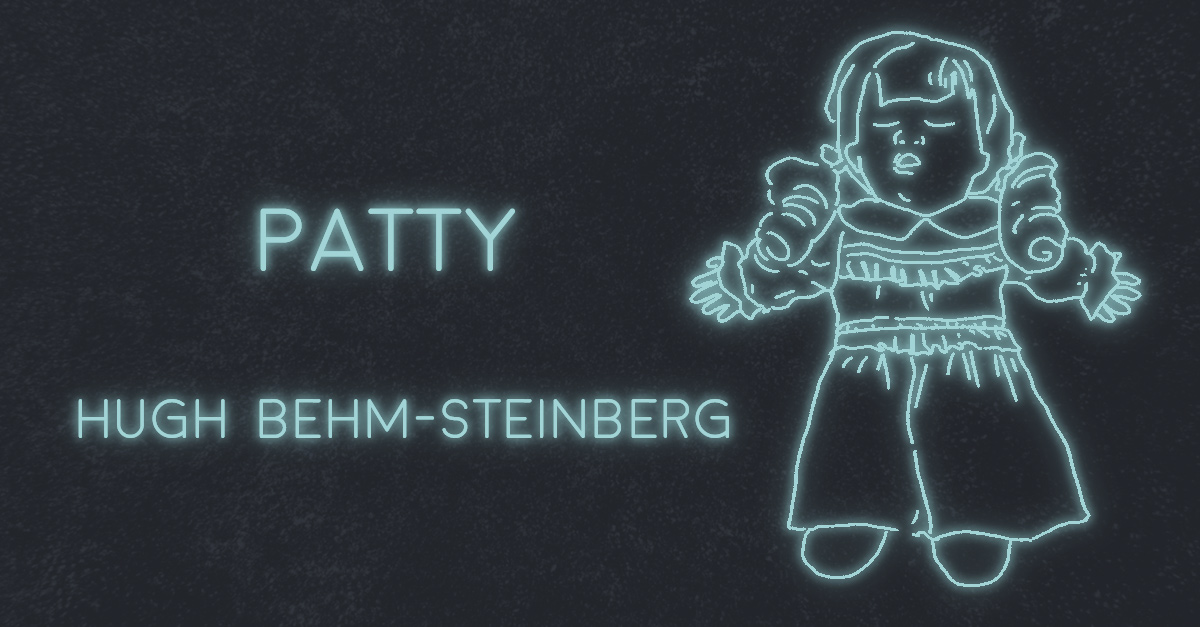The problem with dolls who can do things is that they get bored, you have to keep them busy. If you don’t they get clingy, and it’s so easy to forget to keep the little gold chain on around their neck. They say if you forget about the little gold chain the dolls will chase you everywhere, and then it’s stab, stab, stab.
But mostly they’re just you, only smaller, which is gross in its own way. As you get older, they become more childish, until finally you have to put them in a shoebox and bury them in the yard. You tell yourself you’re growing up and this is what grownups always eventually do. Look carefully in the backyard of your grandparents’ house if you don’t believe.
But your little brother, when you’re over at your best friend Cindy’s house, he digs your doll up, he throws it like a stick to the dog, he plays fetch with your doll, and when it’s all chewed up and slobbered on, he hides it in your room, where it moans in a voice only you can hear. There’s going to be some curses: on you, your brother, that dog. You buried your doll where he could find it, you didn’t bury your doll deep enough, you didn’t do right by your doll. You’re going to have to rescue what you abandoned, that’s a curse in itself you don’t know just yet.
But you don’t have to be that sort of person, you don’t have to be a jerk. You clean the doll up, you make invisible tea, you bring together all your other dolls, the ones who can’t do things, and you pour out all your apologies. It’s going to take a while to work everything out, so you keep your door locked. “Why should I trust you?” the doll says. “Look me in the eye,” she says, when you promise to be nicer. “Take this gold chain off me,” she says.
You take a big breath and you do it.
“When I go to sleep,” you say, “you’re not going to stab me, right?”
“Why do you think I would ever want to hurt you?” If she could cry she would, but she’s not that kind of doll.
You and your doll are practically vibrating—this is something raw and new. It feels like you’ve been sobbing for hours, as you tell her everything in your heart and she tells you everything back. You feel a light inside you, a secret light you can’t tell anyone because they won’t know what it’s like and they’ll just laugh and say you’re a kid, what do you know?
She promises to lift all of her curses. To mark this new turn, you give your doll a new name, Patty.
“I like that name,” Patty says.
You and Patty track down your brother. He looks at Patty and notices she’s not wearing her necklace. “That’s right,” you say, as you knock him over and climb on top of him. “Someone owes Patty an apology, or someone is going to get stabbed in the eye.”
He apologizes and apologizes and apologizes. You tell him you don’t believe him and it’s only a matter of time until Patty sneaks into his room with a kitchen knife. “If you mean it,” you say, “You’ll eat dirt. You’ll eat worms.”
You put your knee on one of his arms. You point to the hole he dug Patty out of.
“I’m sorry,” he wails.
“Shake hands with Patty and tell her you’ll never do it again.”
When it’s dinnertime, you bring Patty down with you, and when your mom looks at you with that aren’t you too old to play with dolls look, you put Patty right in the middle of the table, where everyone can see who’s no longer wearing their golden necklace. Patty cuts loose, leaping from the table to do cartwheels around on the floor. Your dad gives your mom the let’s just put up with it for now look, and while the dog is keeping her distance, everyone else goes back to chatting about their day and eating.
The problem with dolls who can do things is that they hate doing chores, just like you, but it’s your turn to wash the dishes, so you grab Patty. You put on your dishwashing gloves, then carefully slip a pair of dolly gloves on Patty’s little hands.
“We’re friends, right?”
The dishes, glasses and pans, it’s all so disgusting. “It has everybody’s spit on it,” Patty says, shakily.
“If we both do it,” you say, “then it’ll be over with quicker and it’ll be alright.”
“But I’m going to get spit all over me! It’s going to leak through these gloves and then it’s going to get on my skin and it will be like I was back inside your dog’s mouth!”
Patty’s holding her knees with her little dolly gloves and rocking back and forth.
“I was wearing my necklace and I couldn’t do anything to make it stop.”
“It’s ok, you don’t have to do the dishes,” you say.
You put Patty on the windowsill and do all the dishes yourself. You sing her a couple of Taylor Swift songs and soon the two of you are singing together. Together, you and Patty ease.
You make a note to remember this—that it’s ok just to sing, that this is something you know how to do, when someone is frightened so badly they don’t even know how scared they are.
The kitchen knives sit on the drying rack, all in a row, sharp and clean.

